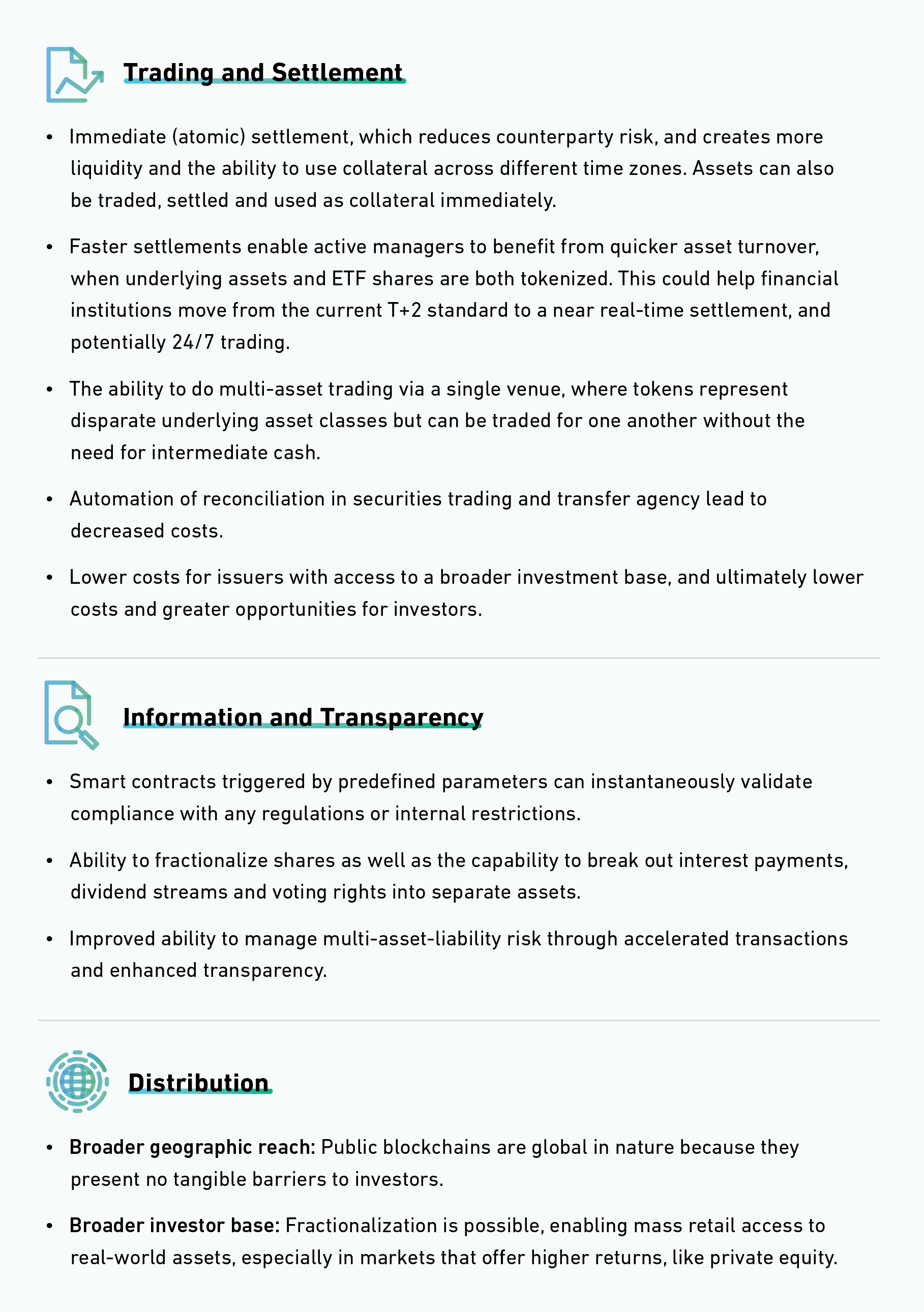Insights
Why Digital Tokenization Is a Priority for the ETF Industry

When an industry faces disruption from a new technology, there is usually a period of “net casting” in which every conceivable or potential application is attempted, or at least considered.
July 2023

Frank Koudelka
Global Head of ETF Solutions, State Street

Jay Biancamano
Head of Tokenization, State Street Digital®

Jeff Sardinha
Head of ETF Solutions for Americas,
State Street
However, for change to take hold, to become innovation as opposed to merely novelty, it needs to meet two essential criteria:
- Represent a genuine improvement of the status quo
- Improve something that people are familiar with, despite it maintaining the status quo
Throughout the history of technology, there have been several attempts to improve existing methods of doing things, that have failed. For instance, minidiscs were unquestionably better than CDs at what CDs did: They were rejected because, post-MP3s, people did not want better CDs; they wanted something different altogether. Meanwhile, streaming improved the distribution and accessibility of non-physical media, which is ultimately how people would have continued consuming their media if streaming had never been invented. It needed this combination of factors to become a hugely successful replacement technology.
The tokenization of capital market assets and the movement of investment processes to blockchain or other digital ledger-based platforms is in this “casting about” phase. It remains to be seen which of its many use cases will become standard ways for investors to conduct their business, and how much of the legacy method will endure. However, there are certain areas where we can apply the two-criteria approach outlined above, and make an informed guess about the likely utilization of future applications of blockchain for financial services.
The case for tokenized ETFs
The tokenized ETFs space is an area to watch closely. To start, asset managers, including hedge funds, mutual funds and ETF managers are moving closer to actually trading tokenized versions of shares in their funds on blockchain (although there are several challenges to make this possible for institutions and other investors as a matter of course).1
As noted by our expert, Nitin Gaur:
“Beyond illiquid assets, the speed and efficiency of trading on the blockchain, removing time consuming reconciliation processes, could create applications for tokenization in already liquid listed shares or units. In particular, ETFs stand to benefit by being tokenized, creating a new way for new participants to issue, hold, trade and service assets. The benefits of blockchain technology will allow for immediate settlement, as well as seamless flow between asset classes via ETFs.”2
Investment institutions stand to benefit in many ways from tokenized ETFs, including:

The liquid nature of tokenized shares, and the ability to trade them directly against each other, allows for efficient management of mismatches between ETFs’ net asset value (NAV) and market share price, as shares can be quickly and easily sold or bought to adjust their prices when they diverge significantly from NAV.
However, benefits alone are not enough for an innovation to thrive. Crucially, tokenized ETFs also need to pass the ongoing demand criteria test. In 2022, ETFs accounted for 70 percent of new United States fund launches, up from 66 percent the previous year, and only 42 percent five years ago.
In Europe, ETFs represented a much smaller proportion of 2022 new fund launches (only 13 percent); however, the proportion of total launches was nearly double five years earlier. ETF assets under management growth in the US and Europe, from 2010 to 2022, has been nearly three times that of mutual funds3. Hence, managers are shifting towards ETFs and bespoke portfolios of assets or requirements (e.g., returns, risk, etc.) for retail investors.
Additionally, the growth of institutional interest in tokenization indicates that the financial services industry is increasingly seeking digital finance-based trading and custody solutions for institutions.
Challenges to ETF tokenization
There are many challenges for tokenized ETFs to become an innovation and to achieve the status of being a mainstream vehicle.
Firstly, regulation needs to advance with the technology. Many jurisdictions with sophisticated, advanced and large investment industries (including the US) currently do not allow ETFs or other funds to hold tokenized assets. This approval in major markets will be essential.
Secondly, the listed nature of ETF shares is a significant challenge. The exchanges on which these shares are traded need to be interoperable considering the various blockchains, potentially public and private, that are being used by the providers and investors who are trading. At the moment, institutions are in some ways ahead of exchanges in investing in the necessary infrastructure to support this.
Thirdly, there is a liquidity challenge. There is a mismatch between the liquidity of an ETF’s shares and the underlying assets they represent. If tokenization and atomic settlement increased the shares’ liquidity, this would be accentuated, with potentially problematic consequences, especially at times of market downturn and distressed selling.
Lastly, there are overarching operational and risk concerns. As we have seen with crypto markets, tokenized markets operate 24/7 every day of the year. ETFs obviously are still traded on local geographic exchanges with traditional opens and closes. A tokenized ETF would benefit from being global and accessible; however, management of the underlying assets would still be a barrier, especially for traditional underlying assets.
Conclusion: Momentum is with tokenized ETFs
ETFs are already a priority for managers thinking about tokenizing their funds or their funds’ underlying assets. We expect further pilot programs in this area, but believe that tokenization is a development that has more potential than most to move beyond the pilot phase, and into the mainstream.


